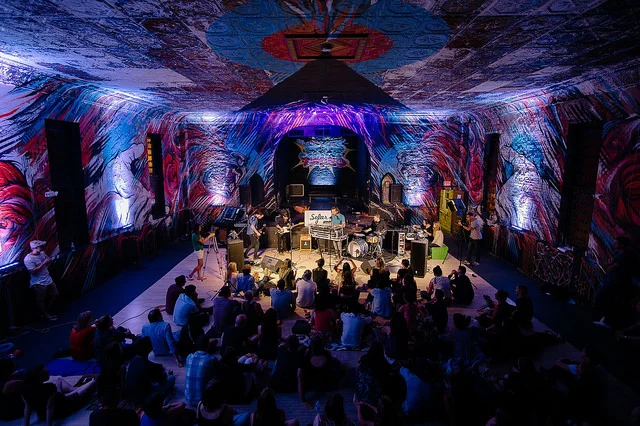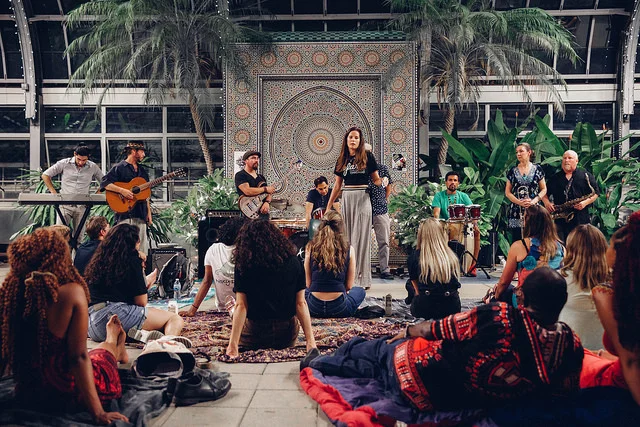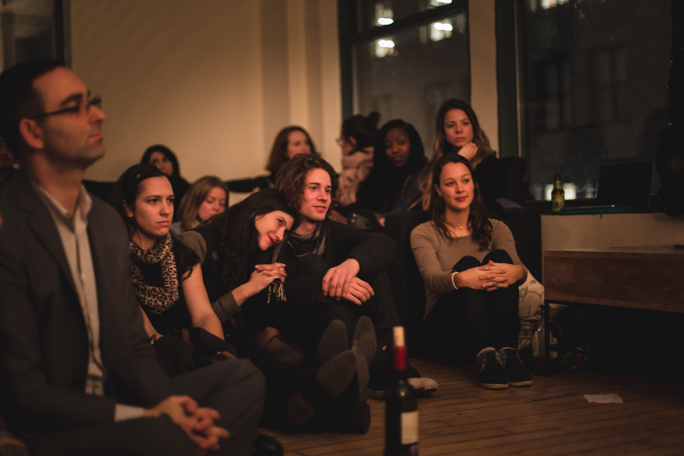An Interview with Rafe Offer: Co-Founder and CEO of Sofar Sounds
I've been a fan of Sofar Sounds and their mission since the beginning, and, frankly, it's been amazing to see their evolution. As a writer and content creator, I've always felt that if I wanted to know a story that perhaps my readership might as well, and that's really how this interview came to fruition.
I don't want to take away too much from the interview with Rafe Offer by offering too much preamble, but for those who don't know Sofar Sounds is a music movement operating in over 400 cities.
Again, all this will be elaborated on further, but Sofar Sounds puts on a "show" in an intimate (and often wonderfully obscure of different) venue and three artists perform for a crowd in the know. I've always liked that there is no opener or no headliner, just three artists strutting their stuff.
To get into a Sofar Sounds show, you merely need to apply to your city (or what city you might be spending some time in). If you're accepted into the show, you'll get a notification to let them know if you can make it. Then, 24 hours prior to the show, they release the location and you arrive for the show.
I can't speak to what the algorithm is for acceptance, but it's usually just a numbers game. I'd say roughly 75 people or so tend to be at each show, but that number can vary based on whether the show is on a rooftop, in a living room, or at a museum (just to name a few locations I've seen shows in the past).
Throughout the interview, I'll be inputting photography which I feel captures the Sofar Sounds experience in full. Also as an aside, Sofar Sounds actually is an acronym for "Songs from a Room," and I think that also paints a picture of the intent of the movement from the onset.
An Interview with Rafe Offer of Sofar Sounds
Sofar London - 11.8.17 (©Ryan Bound)
If you like interviews, you might also like my interview with the founder of Expack a service for expats craving food from their homeland, or Scott Wilson, the founder of the travel shows Departure and Descending.
Chris Mitchell: Thanks so much for taking the time to sit down with me, I’ve been a fan of Sofar for quite some time. If you wouldn’t mind, can you talk about where the idea for Sofar came from or what it was born out of?
Rafe Offer: Thanks for having me, Chris. It’s a pleasure to chat and I so appreciate your kind words. Sofar Sounds was born from frustration — in this case, of a few friends. Three of us were at a Friendly Fires gig in Soho, London and everything felt off. People were talking, the glasses clanging at the bar were competing with the music, and we couldn’t believe how many people were busy watching the show through their phones instead of connecting with the musicians on stage.
We ended up leaving the gig knowing there needed to be a better way to experience live events. A few weeks later, we invited some people over to a London flat where a friend played a couple of songs for us on his guitar. There were about 8 people in the room and I swear, you could hear a pin drop. It was really special.
Chris Mitchell: That's beautiful stuff, and, thankfully, I feel like that's still true at all the Sofar shows that I've been to in recent memory. So, If you were to explain Sofar Sounds to someone who knew nothing about it, how would you break it down for them in a few sentences? How is it all set up?
Rafe Offer: We’re reimagining live events through curated, secret performances in intimate settings around the world. Sofar transforms everyday spaces - from living rooms, lofts and rooftops, to retail stores - into unexpected venues for live shows. Every Sofar experience is wholly unique, a "choose your own adventure" of sorts that empowers discovery of artists, spaces, people, neighborhoods and cities, whether at home or abroad.
Blind Whino - Sofar DC - 9.23.16 (©Mauricio Castro)
"Every Sofar experience is wholly unique, a "choose your own adventure" of sorts that empowers discovery of artists, spaces, people, neighborhoods and cities, whether at home or abroad."
Chris Mitchell: I like the idea of it being a "choose your own adventure," and quite agree. I've never been to two shows that were alike, which I suppose is the goal.
On that note, what, in your own words, is the inherent goal of Sofar Sounds? What do you hope to accomplish or what void are you aiming to fill (or already filling)?
Rafe Offer: We want to put on great live events for guests around the world where they feel they can connect with each other and the artists performing. And more importantly, we want to support the artists who play for us. Many Sofar artists are at the beginning stages of their career and it can be tough — booking gigs, building a following, earning some cash. We want to help them along in this process.
Artists who play a Sofar know they’ll be performing to an engaged audience who comes open and eager to hear and connect to their music or comedy or poetry...whatever their art may be. These intimate shows lead to more fans who are likely to follow an artist on social media after a show or, better yet, go see them at another gig.
Christopher Mitchell: Something people might not realize is that Sofar Sounds is about a lot more than just music, it's really about performance and that can take a lot of forms, which, in my opinion, is fantastic. People around the world have been nothing if not receptive to that it seems.
As far as I can tell, Sofar seemed to spread to other cities largely by word of mouth or organically. In that sense, do you feel like this was a movement that people were genuinely yearning for?
Rafe Offer: It’s a good question. I do think so, yes — people talking at gigs happens everywhere. And phones are everywhere, on all the time, so it’s nice to be able to take a couple of hours away from a screen and on the floor surrounded by other passionate music lovers. People are definitely yearning for a place to just be together, and discover something IRL (in real life.)
If you like interviews you might also like my interview with Chris Noble, one of the originals with World Nomads, or Nomadic Matt, the world's top travel blogger.
Garfield Conservatory - Sofar Chicago - 9.20.17 (©Torie Palacios)
"Artists who play a Sofar know they’ll be performing to an engaged audience who comes open and eager to hear and connect to their music or comedy or poetry...whatever their art may be."
Chris Mitchell: I really get the sense that Sofar Sounds was born out of your discontent with modern audiences at concerts. How do you feel Sofar Sounds confronts that?
Rafe Offer: Yeah. As noted above, that was a huge part of it. And it’s still very much an issue at many gigs. We have a long way to go! At the same time, as Sofar grew, it become a way to also support new music and give musicians a live platform to share their work to a focused audience.
Chris Mitchell: It's quite something that you can find these "focused audiences" at Sofar shows literally all around the world. Sofar Sounds, in general, seems to place a fair bit of merit on locations. Personally, I’ve attended numerous shows, and each location was strikingly different.
Why does Sofar place such importance on location, and how do you think that influences the show?
Rafe Offer: When we first started Sofar, the majority of events were taking place in people’s homes. Almost 10 years later, we’re now curating events in all sorts of unique places, but stress on keeping them intimate. Even in bigger spaces, we keep our capacities at just over 100 people.
Whatever the location may be — Sofar creates an immersive ambiance that brings guests and artists closer together, without the pretense or crowds, that empowers discovery of artists, spaces, people, neighborhoods and cities, whether at home or abroad. Some of my personal favorites include a boxing ring in London, the top of a ski jump in Oslo and the top of the Willis Tower in Chicago. Taking people to a new location adds an element of suspense and fun, while also encouraging them to get away from “normal” gig behavior — instead staying focused on the music in a friendly atmosphere.
Rubblebucket - Sofar NYC - 9.6.16 (©Cheyenne Cohen)
"It has exceeded my initial dream, by a large margin. When we started, it was simply about creating a gig that was special — one with our friends and musicians we loved and who we wanted to support."
Chris Mitchell: I agree with you on all fronts there, the location plays a big role in what Sofar has become. Do you feel that Sofar Sounds, in its current state, lives up to the dream that you initially had for it, or is that “dream” always evolving and expanding?
Rafe Offer: It has exceeded my initial dream, by a large margin. When we started, it was simply about creating a gig that was special — one with our friends and musicians we loved and who we wanted to support. We joked that one day we’d do it outside the UK...maybe in New York. And one day maybe a famous musician would want to perform. When it started to take off - and spread beyond London, it was always a bonus.
And when people from cities we had never even heard of got in touch, like Aalborg or Yekaterinburg, we were a bit awestruck. Now today yes, the dream continues to evolve to adjust to where we are and how we’re expanding.
Chris Mitchell: Well, expand away, my friend, it's a full fledged global movement at this point, and on the radar of many folks who love music. On that note, the list of stars who have performed at Sofar shows in their early days is pretty striking. For you personally, is there one show you attended where you were just blown away by the talent on hand?
Rafe Offer: The first time we ventured out of our comfort level and introduced a new genre, it was mind blowing. For example, Reeps One (a London-based beatboxer) performed and we couldn’t believe how good he was, what he did with his voice. We learned later he was a reigning UK beatbox champion, with 50 million YouTube views!
But to be honest, I’m often stunned by how good the talent is. Another great example is Turkish pianist Ayse Deniz, who is classically trained, but also reimagines rock songs as classical.
If you like this interview, you might also like my interview with NHL Hall of Famer Börje Salming or with the Editor of National Geographic, Don George.
Sofar NYC - Redwood (©Sean McGlynn)
"Watching people connect at the Sofar. We’ve had at least 15 people get married who met at Sofar either as guests or as volunteers. I still can’t believe that. I imagine many more have also found new friendships or love that we don’t even know about."
Chris Mitchell: I'll definitely have to check them out right after this (as should my lovely readers if they've got a minute). Speaking of artists, the lineup for an event isn’t typically disclosed until arrival. Why is that policy in place, and why do you feel it’s important?
Rafe Offer: At Sofar, not only do we not disclose the lineups in advance, we also don’t have any opening or closing acts. We want all of our artists to be treated equally with a guest’s full attention and encourage people to join us on time and stay until the end.
Chris Mitchell: I think that's a great policy and adds a touch of mystique to the whole thing anyhow. You've been running Sofar Sounds for a while now, What’s been your favourite memory from the journey of founding Sofar Sounds from 2009 until now?
Rafe Offer: Watching people connect at the Sofar. We’ve had at least 15 people get married who met at Sofar either as guests or as volunteers. I still can’t believe that. I imagine many more have also found new friendships or love that we don’t even know about. The fact that we have created a vibe and environment that enables people to meet other like-minded people and even fall in love — that’s up there for me as an all-time favorite thing.
Chris Mitchell: Obviously match maker was your true calling in life! Now, speaking of connecting people, social media ihas played a large role in Sofar’s growth. Sofar’s Twitter account, for example (@sofarsounds), regularly showcases great photos from shows around the world. How have you guys utilized social media to take this whole movement to another level and to what end?
Rafe Offer: The majority of Sofar cities all have their own social media accounts, in addition to our main global accounts (@sofarsounds on both Instagram and Twitter). These local accounts are managed by the city leaders around the world, offering them the opportunity to not only promote their shows and the Sofar brand, but also create a unique local flavor that best suits their community and culture. It’s part of what makes us feel truly global. You can walk into a Sofar almost anywhere in the world and the guiding principles are the same, with the city’s own cultural flair.
Indridi - Sofar NYC - 8.30.17 (Photo by B.A. Van Sise for the Village Voice)
"You can walk into a Sofar almost anywhere in the world and the guiding principles are the same, with the city’s own cultural flair."
Chris Mitchell: Does Sofar, in your opinion, still embody the same underlying principles that it was founded upon? (or perhaps even more so?)
Rafe Offer: For sure. Sofar has evolved and grown massively, but our core principles of respecting the musicians and being respectful and attentive at performances are the same. We’ll continue to host Sofars in unique and unusual spaces, all to support a diverse group of emerging talent. None of those things have changed and won’t for the foreseeable future.
Chris Mitchell: I love it, and I'm excited to see some more shows on the horizon. What are you most proud of as it relates to Sofar Sounds?
Rafe Offer: That we’ve helped thousands of musicians get more fans, some cash to help them along and — in many cases — get discovered by media, record labels, their next manager; anything that helps them sustain their careers. We want to be a part of what helps an artist pursue their talent as full-time musicians, doing what they love for a living and bringing joy to all of us with that talent.
Chris Mitchell: I can certainly identify with the importance of supporting local talent that could get lost in the fray as a freelance writer and blogger. I've also seen some incredible shows with Sofar that I've connected with in ways that I just haven't with other, larger shows. Generally speaking, what is it about Sofar that captures people so wholeheartedly? Why is there such a buy-in?
Rafe Offer: That’s tough to answer, as I think it changes for different people. For some, Sofar is the chance to meet people on the night and to discover their new favorite artist(s). For others, they may see us as we are disrupting the music industry in our own small way, by providing an alternative to enjoy live gigs. But at the end of it all, we are a very human way of enjoying a night out — together as one, in a small and discovered space, enjoying great art, in a one-off event.
Chris Mitchell: I can identify with all of those answers in some regard, though particularly the notion of the show being so human and down to earth.
What, Rafe, do you hope is the first thought that pops into people’s minds when someone says “Sofar Sounds”?
Rafe Offer: I have two answers here — one for those who have been to a Sofar show before and one for those who haven’t. If they haven’t attended, I’d love for them to think, “Woah! I hear that Sofar is a really good time and you can enjoy it around the world!” And for those who have, we hope they’re saying, “Can’t wait to go again!”
Chris Mitchell: Well I know that I, for one, can't wait to go again. Thanks so much for chatting with me today, Rafe, it’s much appreciated. Before taking off, I should kindly ask you - where do you hope to take Sofar Sounds from here?
Rafe Offer: I’d love it if people can find and enjoy Sofar on any given night, in their city or places they travel to, literally anywhere around the world. This would hopefully enable a lot of the world’s best emerging musicians to sustain their careers, via Sofar tours and new audiences and gigs around the world.
Chris Mitchell: Hey, if that's the future of music, then sign me up, my friend.
Sofar NYC - 11.15.16 (©Griffin Shapiro)
Are you a fan of Sofar Sounds? Is this the first time you've heard of Sofar Sounds? I'm interested to hear what you think of the interview as well as the movement that is Sofar Sounds. As always, any and all comments are welcome, and I'll respond to each and every comment!







